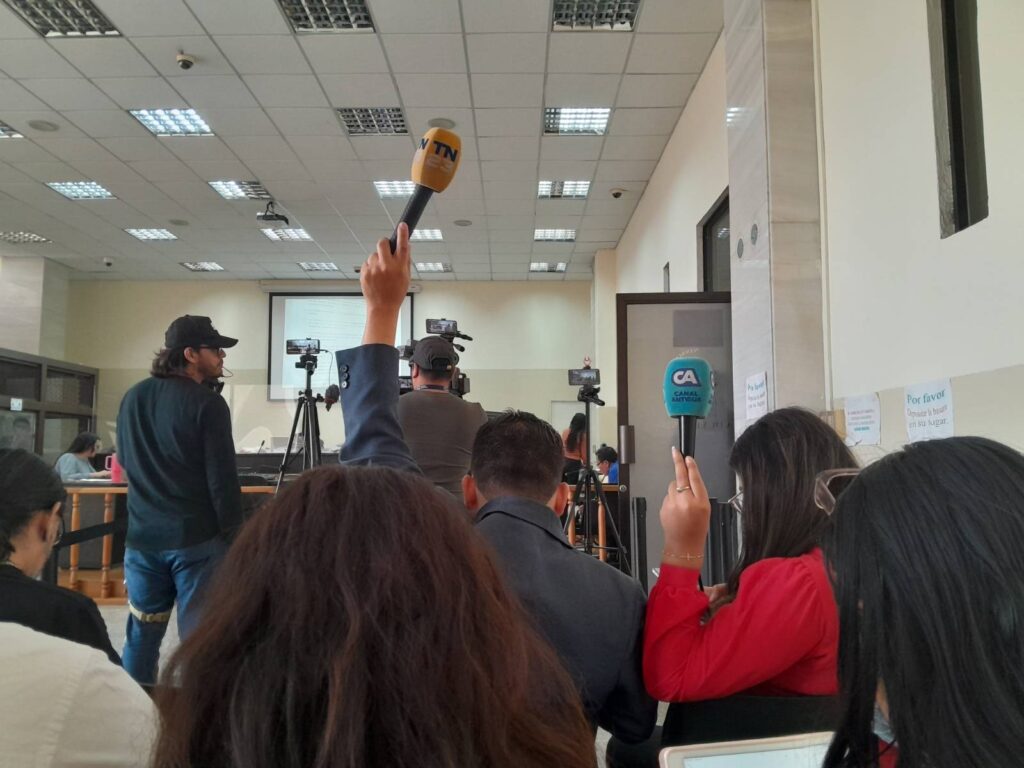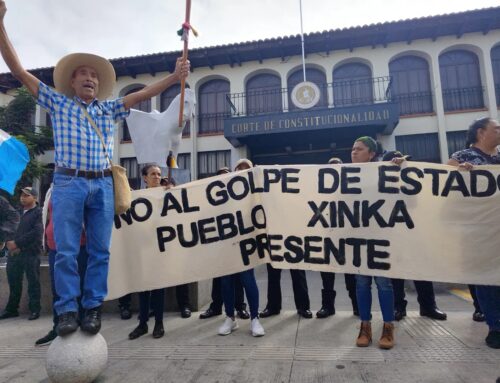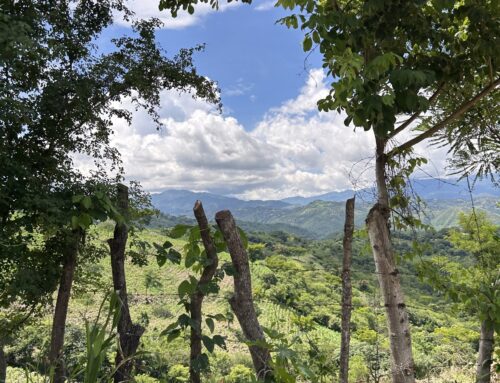Tuesday July 2nd, Hearing 41
Expert witness Alejandro Valencia Villa was presented himself by videoconference to ratify his 2015 expert report, based on International Humanitarian Criminal Law. The expert witness has previously worked in Guatemala, in the cases of the Diario Militar, Molina Theissen and the Chichupac Massacre.
One of the most important conclusions of this expert opinion, according to the expert, is that the Commanders of any army must have absolute control over their subordinates and the acts they commit. In case they commit crimes against civilians, it is the commanders who must be judged according to the law.
The expert explained that International Humanitarian Law (IHL) are minimum humanitarian norms that must be respected in an armed conflict or war. He indicated that “armed conflict” refers to the set of hostilities that develop between armed groups, in the case of Guatemala the army and the guerrilla. The conflict in Guatemala can be called Internal Armed Conflict, because both the guerrilla and the army carried out military operations against each other.
Regarding the systematic attack suffered by the Ixil people, the expert explained that Article 3 of the Geneva Convention prohibits any attack or form of repression against the civilian population. Especially humiliating and degrading treatment. Also any sentence imposed without a fair trial. He added that people who do not participate in the conflict must be treated humanely, including combatants who surrender or lay down their arms. The expert clarified that in Guatemala the civilian self-defense patrols also had the obligation to respect the norms established in Article 3 and added that in Guatemala this Article was not respected by the army and the acts they committed can be qualified as war crimes.
He indicated that the State violated Article 144 of the 1965 Constitution, since this Article indicated that the rule of law was also constituted by international treaties, Guatemala had already accepted the 1952 Geneva Conventions. Therefore, the State had to respect these treaties during the Internal Armed Conflict.
The expert indicated that in the case of a superior chief or commander of an army, he can be judged for the crimes that his subordinates have committed, this because of the chain of command. The expert witness provided him with examples in which International Humanitarian Law has been used in other contexts, such as the crimes of Yugoslavia and Sierra Leone, and also explained that a General has total responsibility for what his subordinates do, since he makes the decisions of what, when and how they should act. He added that this relationship is clear in military structures. The defense’s interrogation was initiated by Antonio Arenales Forno, technical advisor of the defense, to whom the expert witness answered that he used the term “non-international armed conflict” because in Guatemala there were organized guerrillas that were present in important areas of the country. In addition, these organizations had political-military intentions, therefore, the acts that took place during the Internal Armed Conflict cannot be called “internal disturbances or tensions,” a term used by Arenales Forno. The expert added that crimes against humanity, such as those committed in Guatemala, cannot be granted amnesty. The expert underlined that since the 1960s, Guatemala had already made a commitment to respect international humanitarian norms.
Thursday July 4th, Hearing 42
“Plan Victoria 82 talks about recreation places in military camps using very specific language and given the context, it ensures access to sex to soldiers in addition to there being testimonies of women who were taken to the detachments and subjected to sexual violence.” Expert Paloma Soria
Additionaly, a delegation of young Guatemalan-American activists linked to CRLN attended the Court Tower to accompany the genocide trial.
The expert witness Paloma Soria Montañés, from the Swiss embassy, appeared via videoconference to ratify her 2013 expert report on: Gender-based Violence in the Ethnic Group of Mayan Ixil Descent. Paloma Soria is currently a researcher at the United Nations and explained that the methodology of her expert report was based on the testimony of 22 survivors, which were provided by the Public Prosecutor’s Office, and the realization of 3 workshops in Ixil communities, which were attended by approximately 25 survivors each.
She indicated that in her expert testimony she demonstrated that the men also suffered gender violence, by feminizing them in front of their relatives, that is to say, taking away their capacity to defend their loved ones. She responded that in her expert opinion she took into account the facts already condemned by the International Jurisprudence, this because what the Maya Ixil people suffered is comparable to what happened in other conflicts that international tribunals have qualified as genocides, such as in Rwanda and in the ex-Yugoslavia.
She indicated that acts such as gender violence and rape are acts that International Jurisprudence, International Criminal Law and Humanitarian Law indicate as Crimes against Humanity, and therefore must be judged and condemned by the courts of each country. She added that these types of violence constitute serious physical and mental harm, and are therefore irreparable. In addition, linked to the intent of physical destruction, total or partial destruction of a group and in the context of conflict and attacks on the civilian population, they constitute acts of genocide.
In response to the Public Ministry’s question about the army’s discourse of “finishing with the seed that has not been born,” the expert witness pointed out the seriousness of the attacks on pregnant women, not only by killing them, but also by using feticide, which she systematically demonstrates annuls the reproduction of the group.
The expert also spoke of the seriousness of the public and collective rapes (of which there are testimonies). Added to this is the damage caused to them by preventing them from continuing with their family plan due to the damage suffered by the rapes. With respect to sexual slavery, she indicated that she compiled testimonies that indicate how soldiers sexually abused, for days, women belonging to the Maya Ixil people and explained that the soldiers considered their victims as property.
The expert pointed out that forced displacement was more complicated for women, who were in charge of the family nucleus, due to the care-giving roles that women assume and are reproducers of the cultural identity of a group.
The expert explained to the plaintiff that gender violence against men was not so visible, due to the stigma to which they were afraid of being exposed. She clarified that gender violence against men was not only applied in order to take away their ability to defend their families, but also through physical violence, violence that the soldiers exercised on them in front of their families and in the worst cases the torture to which they were subjected in the detachments, for example by beating them or burning their genitals.
She stated to the representative of the plaintiff that international standards indicate that the testimonies of the victims indicate that they were caused irreversible trauma, as well as physical and psychological damage that remains today, with consequences that sometimes last a lifetime. The expert also explained that the rape of women not only impacts the individual victim, but the community as a whole.
The expert also mentioned that the victim may not remember in detail everything that happened to her and that this is not a reason to devalue her testimony. She clarified that Ixil women use other terms to refer to the sexual crimes to which they were subjected because they still live under a stigmatization, however, the jurisprudence allows them to use other terms: “The victim does not have to use the word itself (rape), in many cultures it is linked to shame, and they use other terms, that does not demerit that it is clear what the fact was.”
According to estimates, 88.7% of women in the Mayan Ixil population suffered sexual violence, however, the expert pointed out that it is possible that this data is underrepresented: “Stigmatization is a reality, some people still do not talk about it, so it is very difficult to know the real number of people who suffered experiences of sexual violence.”
The expert witness also explained that “Plan Victoria 82 talks about recreation places in military camps using very specific language and given the context, it ensures access to sex to soldiers in addition to there being testimonies of women who were taken to the detachments and subjected to sexual violence.”
Regarding the female mutilations that many women suffered during the Internal Armed Conflict, she responded to the defense that she had access to a statement that mentioned them.
After finishing the testimony of the expert witness, Lucas García asked to speak, and said that he was not responsible for the charges for which he is accused. After his statements, the Public Prosecutor asked him what his functions were as Chief of General Staff and Lucas García answered that it was to give instructions to generals and colonels. The Public Prosecutor asked him if he was aware that his orders were not obeyed and he said no and that if they had been, he would have shot them.
The hearing was finally concluded and scheduled to resume on Monday, July 10.

Journalist and public attending the Court hearings. Photo: NISGUA






Leave A Comment